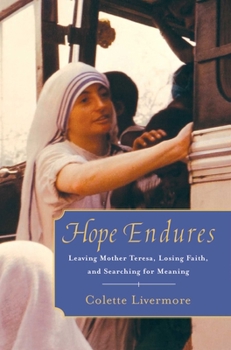Hope Endures: Leaving Mother Teresa, Losing Faith, and Searching for Meaning
Select Format
Select Condition 
Book Overview
The searing memoir of an extraordinary woman who served as a nun for eleven years in Mother Teresa's order, Hope Endures is a compelling chronicle of idealistic determination, rigid discipline, and shattering disillusionment. In?her life's journey from certainty to doubt, Colette Livermore enters the Missionaries of Charity order in 1973 with unwavering faith and total surrender of?her will and intellect after seeing a documentary on the order's...
Format:Paperback
Language:English
ISBN:1416597832
ISBN13:9781416597834
Release Date:April 2014
Publisher:Atria Books
Length:272 Pages
Weight:0.65 lbs.
Dimensions:0.8" x 6.0" x 8.9"
Customer Reviews
3 ratings
Faith
Published by Thriftbooks.com User , 14 years ago
This is a moving accunt written by an Australian woman who went straight from college into Mother Teresa's order. She ultimately left both the order and the church to become an M.D. serving the back country population in her home country. It is a very moving account of the growth of faith, including its doubts. If you, too, feel the desire to follow your own path to God, I think you'll be as encouraged as I was.
It's not the "RULES", it's the "RULER"
Published by Thriftbooks.com User , 15 years ago
This book reminded me a great deal of Karen Armstrong's experiences as described in her autobiographical work, "The Spiral Staircase". I had a similar experience after leaving a religious denomination after almost two decades and instantly finding myself cut off from almost all of the relationships my family and I had built there. As many others have, I've found that religion isn't so much about the "dos" and "don'ts", but about my choice to do good and focus my energies on fulfilling my purpose in life in the most meaningful ways.
BEYOND THE SPIN
Published by Thriftbooks.com User , 15 years ago
HOPE ENDURES is a long awaited book which explicates in some ways what it is like to be a Missionary of Charity. The very reflective work goes beyond the usual spin regarding Mother Teresa and her community of sisters, and presents an experience that one woman had as a vowed member. I am bold enough to suggest that many similar articles and books will be forthcoming because the human community, especially those who share the Christian faith, are passionately interested not only with the ideas presented to us in a myriad volumes about the saint of Calcutta, but also in the intrinsic challenges in donning the Christ-life within that structure and paradigm. The reader will feel as if she or he is having dinner with the author, Colette Livermore. While Dr. Livermore shares difficulties with the lived experience of the charism and rule of the congregation, she does not attack. With the reader she reflects on her own experience, proffers some insights about structures, and leads to further exploration of what it means to be on a journey to find the Truth which has been promised to set us free. In many ways the book tells a love story. It reveals an idealistic young woman who is seduced, as it were, by the holiness and goodness of Mother Teresa, and her overwhelming service to the poorest of the poor. Livermore is affable in her telling stories of the other sisters, women on the same journey as she. Her actual love is even more pronounced in her speaking of those served by herself and the community.In ways that are most helpful (to we who struggle to serve Christ in distressful disguise in our own communities) she is not timid about sharing the flaws in the system. Any group made up of a few thousand members is bound to have a few nut-cases, or peers who seem to have absolutely no idea why they are doing what they are doing. Probably every religious community has members who seemingly cannot connect the dots, members who become a cross for everyone else. While that fact is not surprising, the fact that is most unexpected is the anti-intellectual attitude within the congregation. While it is laudable to think of oneself as a pencil in the hand of God, it is not so good to be that pencil with neither a lead nor an eraser. It would seem to this reader that the Missionaries of Charity and those they serve freely would be better served with proper education, certification, cultural orientation, and some specialization. Moving women from one place to another minus language skills and cultural awarenes, and giving them services to perform for the poor without any training seems to be a form of magical thinking, dangerous service, and affront to Providence. In every other community where this has happened the group has fractured within a quarter century of the founder's death, no matter how holy was the charismatic founder. There are some chapters I would have edited. For example, the final chapter would have been a superior first chapter, I th






